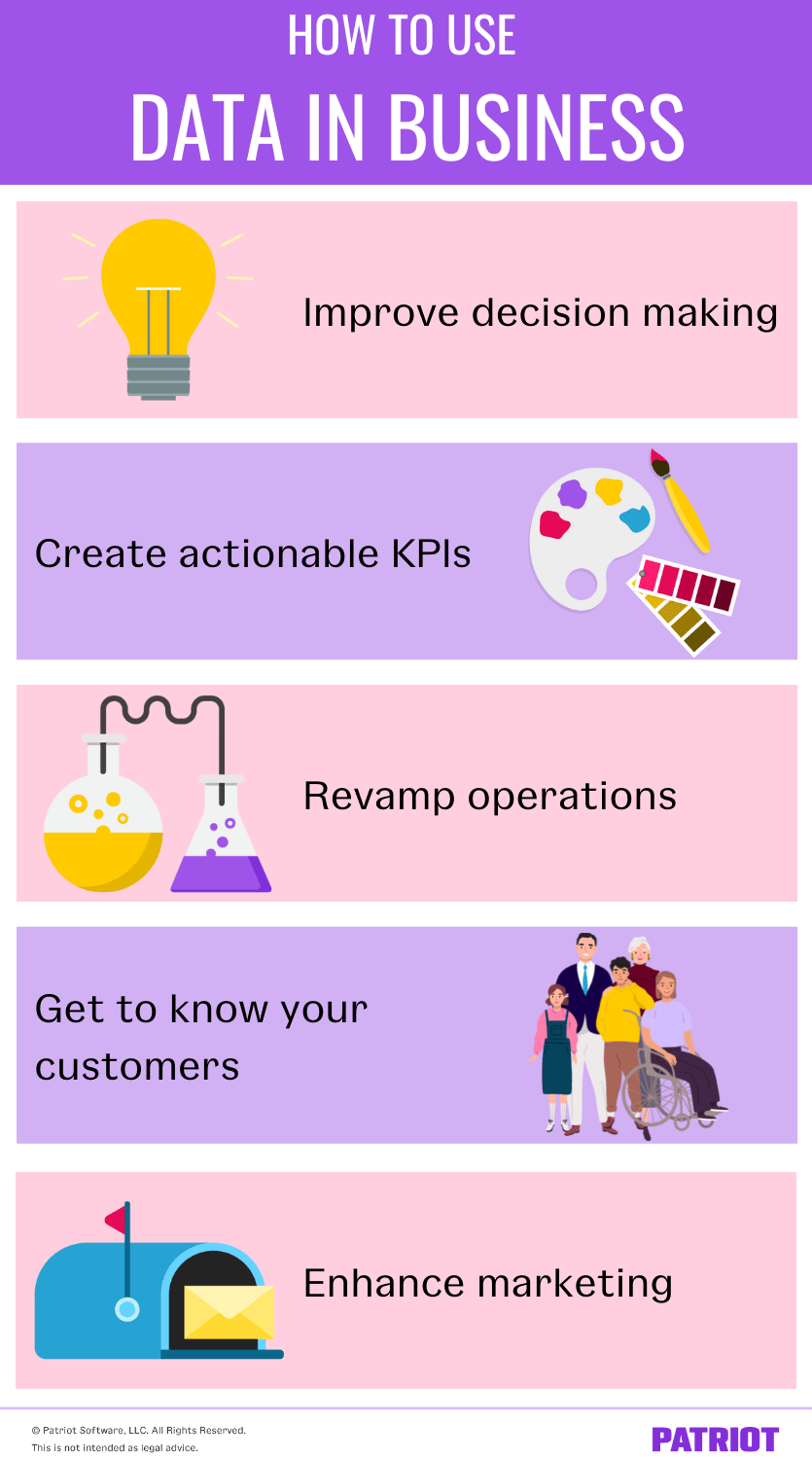Many businesses (31% of them to be exact) claim to be data-driven. Does yours? And if so, do you actually know how to use data in business? Or, are you just flying by the seat of your pants? If you want to learn how to use business data the right way and find out how to use it to drive your business to success, keep reading.
Importance of using business data
So, what is business data, exactly? Business data isn’t something you gather just to collect dust on your shelves. It’s something you can use to make adjustments and propel your business toward success. And if used right, it can be an asset to your business.
Sure, business data can help your business grow and give you insight on how well you’re handling certain processes. But, it can also:
- Save your company time and money
- Improve your bottom line
- Help you avoid wasting resources
- Better understand your business and its customers
- Learn which metrics to measure
- Predict trends
Now you know why is data important for business. But, you also have to know how to use it to make it work to your advantage. Otherwise, you could wind up wasting time and energy (and no business owner wants that!).
Want to impress your friends at a dinner party?
Get the latest small business news delivered straight to your inbox.
Subscribe to Email ListHow to use data in business: 5 Ways
Although data for business is chock-full of perks for companies, too many ventures out there don’t know how to use business data. And, not knowing how to use data in business can put a damper on your business’s success.
Not-so-fun fact: Up to 73% of all data within a business goes unused for analytics. So chances are, your business could be wasting valuable data and by not knowing how to use it the right way.
Concerned that you fall into this camp? No worries. If you want to ensure your business is making the most out of its data, read on. Then, take action!

1. Improve decision making
When it comes to running a business, you have to make decisions left and right. But, you can’t make informed decisions without having solid reasoning to back up your choices. If you want to improve your business’s decision-making and head down the road to success, use business data while going through the process.
Use data to back up your decision making and help you make stronger decisions about:
- Customer service
- Marketing
- Growth strategies
- Pricing
When you back up your decisions with solid data, you won’t just rely on your gut. So to help make insightful decisions, look at the data you have and see if it needs any improvements. Take the steps to perfect your data so you can use it to reinforce your business decisions.
2. Create actionable KPIs
You can translate your goals into a lot for your business. One way to leverage your data in a smart way is by turning them into KPIs. So, what in the world is a KPI?
A KPI, or key performance indicator, evaluates the success of your business by looking at how effectively your company achieves key business objectives. Here are some examples of KPIs your business can measure:
- Website visitors
- Blog subscribers
- Customer satisfaction
- Profit margin
- Customer retention rate
- Revenue growth
- Employee engagement
KPIs can range anywhere from profit margin to customer satisfaction. Plus, it can include internal metrics, too, such as employee satisfaction or retention.
After your business establishes which KPIs it wants to track, you can use them to create overarching goals. Then, you can use your business data to update KPIs and make adjustments over time.
3. Revamp operations
Another use for data? Improving and revamping business operations.
Your operational processes can make or break your company’s success. Make too much product? You could wind up wasting money. Make too little product? You can’t keep up with customer demand. So, what better way to ensure your processes are the best they can be than by using business data?
Use data—like product line, inventory, or delivery statistics— to see which processes need improvement. Has the production line slowed down over the past few months? Pinpoint problem areas and make changes to improve operations. That way, you can crank out exactly as much as you need and reduce waste.
4. Get to really know your customers
How well do you really know your customers? So-so? Not a whole lot? If your business needs to know its customers on a deeper level, you can use business data to do it.
Data and analytics give you insights into your customers that you may not see on the surface. Not to mention, thoroughly understanding your customers is a big key to growth. Getting to know your customers through business data can help you attract and retain customers, improve customer service, and increase sales.
Not sure where to start when it comes to business data and customers? Here are some things you can measure to help strengthen your relationship with customers and keep growing:
- Customer satisfaction (e.g., net promoter score)
- Customer lifetime value (CLV)
- Feedback (e.g., online reviews)
- Customer retention rate
- Churn rate
- Retention cost
- Recurring revenue
The more metrics you track, the better your business can improve its connection with customers and retain them for the long haul.
5. Enhance marketing
If you want to boost sales and attract customers to your business, you need to have some type of marketing strategy. Otherwise, how will potential customers hear about your business and come flocking to your door? And once you establish some strategies, you can begin tracking data to improve your tactics.
To ensure you’re spending your marketing budget wisely on the right ads and target markets, you can look at business data. You can also use your data to see which marketing processes you need to fine-tune, like email marketing.
To track your marketing metrics, consider making a spreadsheet of data you want to track regularly (e.g., SEO, website visitors, etc.). That way, you can compare your metrics over time and make informed marketing decisions going forward.
This is not intended as legal advice; for more information, please click here.
